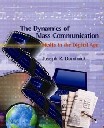|
 |  Dynamics of Mass Communication: Media in the Digital Age, 7/e Joseph R. Dominick
Social Effects of Mass Communication
Main Points- Surveys and experiments are the two main
quantitative techniques used to study the effects
of mass communication.
- Media can serve as socialization forces when they
are the primary sources of information about a
topic and that information is presented in a
consistent manner.
- Media can cultivate false perceptions of reality
among some heavy users.
- TV ads directed at children can influence attitudes
and perceptions about certain products.
- The media can set the priority of certain issues for
the public.
- TV viewing does little to help academic skills.
- TV violence shows a small but persistent
correlation with antisocial behavior among heavy
viewers.
- Experiments have shown that TV can produce
prosocial behavior, but little evidence of this effect
has been found in surveys.
- Television has had little effect on voter turnout.
The media are more effective in reinforcing or
crystallizing a person's voting choice. TV has had
significant impact on the conduct of politicians
and political campaigns.
- Exposure to pornography has been linked to
feelings of sexual callousness.
- The main topics of research concerning the
Internet are its effects on the usage of other media,
the relationship between social isolation and
online media use, and the new phenomenon of
Internet addiction.
- Future concern about the effects of mass
communications have implications in the areas of
privacy, isolation, and escape.
|
|
|



 2002 McGraw-Hill Higher Education
2002 McGraw-Hill Higher Education